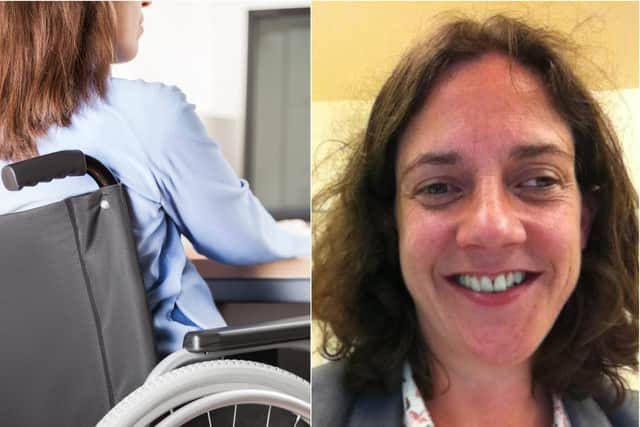Disabled Edinburgh mum claims she's lost out on £90k of potential earnings due to being 'overlooked by employers'
and live on Freeview channel 276
The Office for National Statistics (ONS) found that in 2018, the average pay for non-disabled workers across the UK was £12.11 an hour, against £10.63 for disabled.
This data highlights the struggles many disabled workers in Edinburgh face when searching for well paid, long-term and meaningful employment.
'Barriers'


Advertisement
Hide AdAdvertisement
Hide AdA disabled woman who has worked in the capital since 2005 said she experienced “multiple” and “significant” barriers in her career, and despite improvements, particularly in the third sector, disabled people still suffer considerable disadvantage when seeking equal pay for equal work.
Susie Fitton, 42, is originally from London but has lived in Buckstone with her two children for the past 14 years, since graduating from the University of London.
The mother of two has a mental impairment which she claims has caused her to “be overlooked for promotion by employers” and “lose out on over £90,000 of potential earnings over four years”.
Now a senior policy adviser working for a charity, helping disabled people find employment, she says that the loss in potential earnings is a common trend in disabled people’s careers.
Advertisement
Hide AdAdvertisement
Hide AdShe said: “I know I am not the only one who has faced these barriers. While many education leavers face a period of instability, for graduates with disabilities this is often considerably longer.
“In my current role, I work with many very high-achieving disabled graduates who are overlooked for jobs and promotions because of their disabilities.
“Whether it is lack of wheelchair access, or employers not wanting to make workplace adjustments because of fear of costs, there are very real and complex barriers that disabled graduates face when entering the workforce.”
She added that a central reason for the continued inequality is the “culture of low expectations” which she experienced post-graduation.
Advertisement
Hide AdAdvertisement
Hide AdAfter leaving university in 2002 the new graduate faced a prolonged period of ill health which required her to stay in hospital.
Through this time she noticed that expectations of her ever entering full-time work were low.
She said: “I remember when I finally managed to get a job as a cleaner and everyone was delighted for me. I remember thinking, ‘I have two degrees, is this all I can do?”
Despite these setbacks, Susie has managed to build a successful career in policy and recognises that there “have been some improvements” for disabled employees in recent years.
Advertisement
Hide AdAdvertisement
Hide AdBut she added: “With many employees, there is still this perception that disabled people lack the skills, motivation or confidence to excel in careers.
“So many very capable disabled employees have to fight so hard against this stigma just to get their foot in the door and receive a fair wage.”